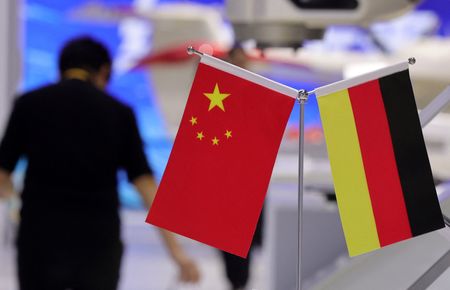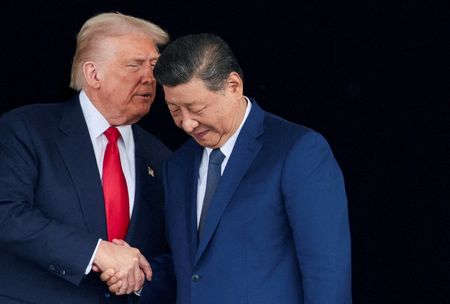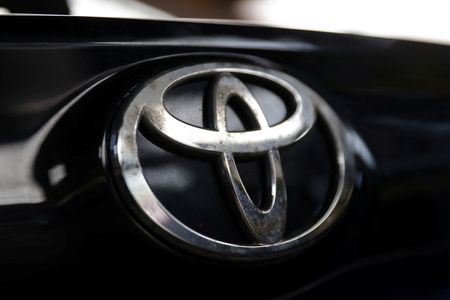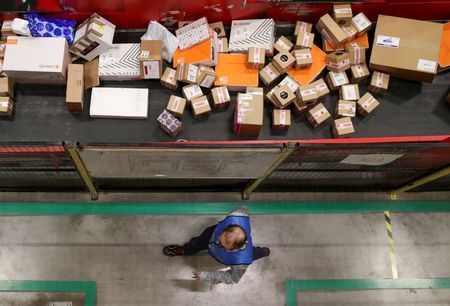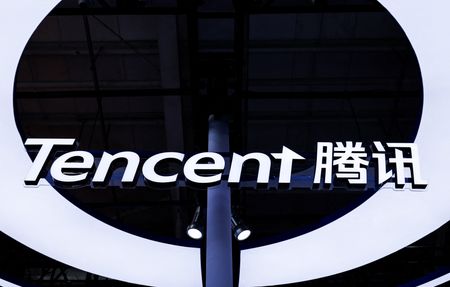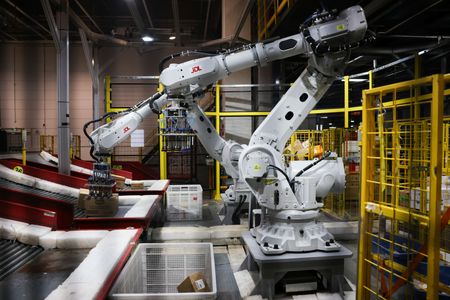By Maria Martinez
BERLIN (Reuters) -Germany’s parliament appointed an expert commission on Thursday to rethink trade policy towards China, accelerating a policy of “de-risking” after Beijing’s curbs on rare earths exports exposed how quickly German industry could be throttled.
While a 2023 China strategy paper, which was commissioned by the previous government, contained only general recommendations, this time the committee of industry associations, labour representatives and think tanks will send actionable recommendations to the government for drafting legislation.
The commission will examine energy, raw material imports and Chinese investment in critical infrastructure, and its creation comes days before Finance Minister Lars Klingbeil travels to China to press the European Union’s case on a raft of issues.
Germany has felt particularly vulnerable towards its largest trading partner this year, caught between U.S. President Donald Trump roiling global trade with swingeing tariffs and China flexing its own muscle with export curbs.
“China can and will turn off the tap in critical areas; we remain far too vulnerable — so the pressure to act is now much higher,” said Juergen Matthes, head of international economic policy at the German Economic Institute IW.
Klingbeil will be the first minister of the new coalition to visit China as Foreign Minister Johann Wadephul postponed his trip, which was planned for the end of October, after Beijing confirmed only one of his requested meetings.
A small delegation of representatives of German banks and insurance companies will travel to China next week with Klingbeil, a source familiar with the matter told Reuters.
“Risk management will play a larger role in the future China strategy. The question is: where are the levers China could use to exert political pressure, and how do we avoid them?” said Juergen Hardt, spokesperson for foreign policy of the ruling conservatives.
RARE EARTHS SHOCK WAS A WAKE-UP CALL
Europe’s manufacturing export powerhouse Germany for years reaped the benefits of selling goods to China’s vast and growing market. But in a strategy on China agreed in 2023, the previous government urged the “de-risking” of the two countries’ economic relationship, calling Beijing a “partner, competitor and systemic rival”.
The 61-page document urged German firms to reduce their dependence on China but was light on any binding targets.
A study by the German Economic Institute IW showed that in 2024, Germany’s potentially critical import dependency on China had hardly changed, compared with the previous year in which the China strategy was adopted.
“Since the 2023 China strategy, I see no real progress on de-risking in my empirical research — what should have set off alarm bells just didn’t,” said Matthes, author of the study.
According to this analysis of over 14,300 product groups, only about 200 currently rely on China for at least 50% of their product import needs, indicating that while import dependency is concentrated in a small number of product areas, these could still have significant economic impacts.
“The elephant in the room is the dependency,” said Jens Eisenschmidt, Chief Europe Economist at Morgan Stanley. “Decoupling is just impossible.”
German Chancellor Friedrich Merz took office in May promising to revive growth in Europe’s largest economy following two years of contraction.
“I don’t think there has been a major effort in the government to rethink China as yet. It is simply a capacity issue,” said Eisenschmidt, noting that government bandwidth had focused on domestic reforms.
Merz initially seemed focused on getting to a good working relationship with the Trump administration and pushing for peace in Ukraine and the Middle East.
But when China imposed restrictions on rare earth exports, it made Germany’s vulnerability clear, as it imports about 80% of its supply from China.
German companies were again left reeling after a row between the Netherlands and China over chipmaker Nexperia, which makes billions of chips for cars and other electronics, triggered a global supply chain crisis.
(Reporting by Maria Martinez; editing by Matthias Williams, Alexandra Hudson)

